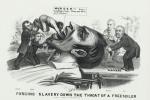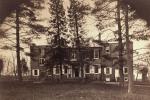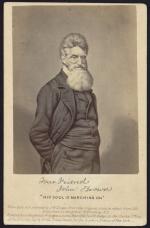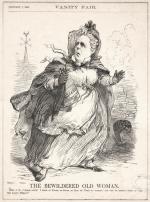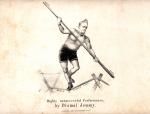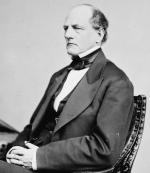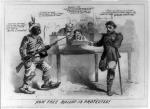Chapter One: Pennsylvania Democrats
"May we not, then, hope that the long agitation on this [slavery] subject is approaching its end, and that the geographical parties to which it has given birth, so much dreaded by the Father of his Country, will speedily become extinct? Most happy will it be for the country when the public mind shall be diverted from this question to others of more pressingand practical importance."
Inaugural Address of President James Buchanan, March 4, 1857.
At his inauguration on March 4, 1857,
Buchanan was not alone in his woeful underestimation of the divisiveness of slavery. Though his home state of Pennsylvania had long ago outlawed slavery, many conservative Democrats believed that because the Constitution recognized the institution of slavery, the federal government had no right to interfere with it.
As part of the Compromise of 1850, Congress passed a strong Fugitive Slave Law, which allowed slave owners and federal officers to cross into Free states to recover runaway slaves. This measure outraged Pennsylvania abolitionists, including Governor William Johnston, a Free Soil Whig, who refused to repeal state laws protecting escaped slaves or to aid in the enforcement of the new federal law.
On September 11, 1851, the death of Edward Gorsuch, a Maryland farmer killed while trying to recover his human property from a farm near
The Democrats, however, recovered quickly. In 1856, James Buchanan, who had grown up in
In the general election, he won Pennsylvania and the election, defeating John Frémont, who had won the
In his 1857 inaugural address, Buchanan told the nation that he considered slavery in the territories a judicial question, "of but little practical importance" that the Supreme Court of the United States would speedily and finally settle. "To their decision, in common with all good citizens, I shall cheerfully submit." Two days later, the Supreme Court announced its explosive decision in Dred Scott v. Sanford: Congress had no constitutional right to legislate slavery in the territories, and African Americans were not and could not become citizens of the United States.
The ruling infuriated the anti-slavery movement, and Buchanan did little to alleviate the tensions, siding with Southern interests on almost every occasion. As tensions mounted,
In the midterm election of 1858, Republicans took twenty of Pennsylvania's twenty-five congressional seats and won control of the U.S. House of Representatives. Buchanan, however, continued his support of what he saw as the constitutionally guaranteed rights of the South, and repeatedly condemned abolitionists' "agitation" of the South over the question of slavery. In spite of the president's scolding, agitation only increased.
In 1859, one "Isaac Smith" took up residence at a Chambersburg, Pennsylvania boarding house. No one local knew that Smith was actually
To President Buchanan the raid represented "an incurable disease in the public mind, which may break out in still
In the presidential election of 1860, Republican Abraham Lincoln carried Pennsylvania and won the office without receiving a single electoral vote from the South. First South Carolina and then six other southern states quickly passed articles of secession. Now officially a lame-duck, Buchanan asserted that the states had no right to secede but took no action to stop them, arguing that he lacked the constitutional power to do so.
Both Buchanan and Bigler, representing the sentiments of many Pennsylvania Democrats, supported the last-minute Crittenden Compromise–a constitutional amendment which would have restored and extended the Missouri Compromise. With the Union in shambles and his reputation ruined, Buchanan then retired to
The Civil War split the Pennsylvania Democratic Party–and its citizens. Some Democrats supported the war, but others known as "Copperheads" mounted a significant opposition. During the secession crisis, conservatives held rallies all over the state calling for reunification with slavery intact. A smaller group advocated the independence of the Confederacy. A few radicals, led by Philadelphians with ties to the South, suggested that Pennsylvania also should secede and
During the Civil War, more than 2,000 Pennsylvanians took up arms for the Confederacy. The Johnstown Democrat, the West Chester Jeffersonian, the Bellefonte Democratic Watchman, and other Democratic newspapers ran articles highly critical of the war and President Lincoln.
Opposition to the war was widespread throughout the state. Many white Pennsylvanians lamented fighting for the benefit of African Americans, whom they regarded as racially inferior. In northeastern Pennsylvania, immigrants working in the coal mines feared that their employers would replace them with lower paid black freedmen. The draft was extremely unpopular statewide, desertion was widespread, and federal draft commissioners faced violence in every corner of the Commonwealth.
Just how powerful was the Copperhead, antiwar movement in Pennsylvania? In 1862, conservative Democrats took control of the State House of Representatives and picked up four U.S. congressional districts, after conservative judges ruled that the state constitution did not allow soldiers to vote outside of their home districts. Control of the legislature allowed Democrats to elect Charles Buckalew, a war critic, to the U.S. Senate in 1863.
That same year, incumbent Republican
After Lincoln's re-election in 1864, the Copperhead movement faded. The Democratic party's association with the peace movement, however, would cost it dearly. Republicans would dominate state politics from the end of the Civil War until the Great Depression.
James Buchanan was not a Copperhead. Like many Democrats who initially favored appeasement, he supported suppression of the rebellion after the Confederates fired on Fort Sumter but disapproved of Lincoln's liberal interpretation of the Constitution and the restriction of civil liberties during the war.
Seeking to restore his tattered image, Buchanan spent the Civil War writing a





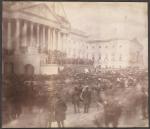
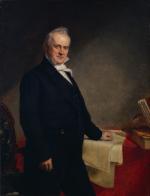
![A campaign parody somewhat favorable to Republican candidate John C. Fremont, but suggesting a conspiracy between Fremont and Millard Fillmore to defeat Democrat James Buchanan. Buchanan's nickname "Ten Cent Jimmy" was a derisive label applied to him by labor interests. In the background behind a fence Buchanan can be seen addressing a working-class gathering. "Gent[leme]n," he harangues them, "if you put me in, why I promise that you shall be on the same plan as the laborers of Europe, Ten Cents a Day." Fillmore crouches this side of the fence, watching. Fremont, with a carpenter's tools and smock, and shirtsleeves rolled, stands in the foreground. Fillmore (aside, to Fremont): "Monte, I've got my eye up on the old Buck–with such a crowd as he's got, he can't go in, I'll Bargain with you? If I can't win, why you shall." Fremont: "All right, agreed and if I don't win why you shall, but look here, If Ten Cent Jimmy wins we working men will have Ten Cents a Day. How are we to live? look at the price of provisions." To the left is a "Cheap grocery & provision store" offering pork at ten to eighteen cents per pound, "Fine Buck" at two and a half cents, cabbages at ten to twelve and a half cents each, and other produce at equally high rates. At right is the boardinghouse of "Mrs Woodbee Late Pierce" (no doubt a disparaging reference to Democratic incumbent Franklin Pierce) offering rooms to mechanics at three dollars per week. A scrawny dog barks at the door. A campaign parody somewhat favorable to Republican candidate John C. Fremont, but suggesting a conspiracy between Fremont and Millard Fillmore to defeat Democrat James Buchanan. Buchanan's nickname "Ten Cent Jimmy" was a derisive label applied to him by labor interests. In the background behind a fence Buchanan can be seen addressing a working-class gathering. "Gent[leme]n," he harangues them, "if you put me in, why I promise that you shall be on the same plan as the laborers of Europe, Ten Cents a Day." Fillmore crouches this side of the fence, watching. Fremont, with a carpenter's tools and smock, and shirtsleeves rolled, stands in the foreground. Fillmore (aside, to Fremont): "Monte, I've got my eye up on the old Buck–with such a crowd as he's got, he can't go in, I'll Bargain with you? If I can't win, why you shall." Fremont: "All right, agreed and if I don't win why you shall, but look here, If Ten Cent Jimmy wins we working men will have Ten Cents a Day. How are we to live? look at the price of provisions." To the left is a "Cheap grocery & provision store" offering pork at ten to eighteen cents per pound, "Fine Buck" at two and a half cents, cabbages at ten to twelve and a half cents each, and other produce at equally high rates. At right is the boardinghouse of "Mrs Woodbee Late Pierce" (no doubt a disparaging reference to Democratic incumbent Franklin Pierce) offering rooms to mechanics at three dollars per week. A scrawny dog barks at the door.](cache/small/1-2-199E-25-ExplorePAHistory-a0m1j1-a_349.jpg)
